Covid-19 caused unprecedented disruption to the fast-moving consumer goods (FMCG) sector, and raised vital questions about the ability of the food and logistics systems to cope in moments of crisis. However resilience is not the only consideration that Covid-19 raises for the FMCG sector. Longer-term, firms will need to face up to a profoundly different consumer landscape – and be ready to adapt quickly to the new trends that the pandemic has spawned, as well as the existing ones it has accelerated.
Here, Gama looks at just some of the new realities of the post-Covid FMCG environment, as well as a few of the innovators who are already capitalising on the consumer attitudes and behaviours that have changed so profoundly in the space of the last few months.
COMMUNITY SPIRIT AND KEYWORKER ADMIRATION
A new-found sense of community spirit has sprung up all around the world in response to Covid-19, with neighbours reconnecting and admiration rekindled for the key workers that have formed the backbone of the crisis response – from the doctors and nurses caring for the sick, to those in the FMCG supply chain keeping supermarket shelves stocked with essential goods.
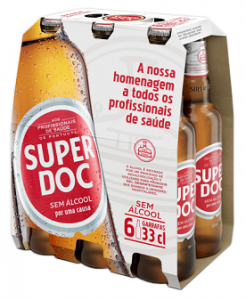
Some brands are using CSR initiatives to align themselves with “keyworker admiration”.
Unsurprisingly, this sense of goodwill, especially towards healthcare workers, has engendered some novel responses from companies keen to align themselves with the sudden phenomenon of ‘keyworker admiration’. A good example is Super Bock Super Doc Beer, made using a de-alcoholisation process that has enabled the company to provide over 18,000 litres of hand sanitizer to Portuguese hospitals. Other alcohol brands have similarly flagged their support for the medical sector by adapting their manufacturing techniques.
CSR initiatives have also taken a more direct form when it comes to helping keyworkers. This includes campaigns donating proceeds to charitable initiatives – such as the new CarryOn Sparkling CBD Drink, supporting the Angel Relief Fund for US hospitality workers – to initiatives providing discounts to keyworkers, including Princes Hero Pack – an assortment of canned foods delivered direct to consumer (DTC) via the UK’s Blue Light Card scheme.
While companies should be wary of damage to brand reputation if any Covid-19 campaign is viewed as opportunistic or a form of virtue-signalling, rather than a sincere and genuine effort to support good causes, such initiatives can also help brands garner valuable positive public attention, especially if they chime with the prevailing public mood.
THE RISK-AVERSE CONSUMER
While Covid-19 may have rekindled community spirit and engendered a new sense of togetherness, there is no doubt that the disease has also created a consumer base that is more risk-averse, uncertain for the future, and more concerned over hygiene, food standards and – in some cases – financial security.
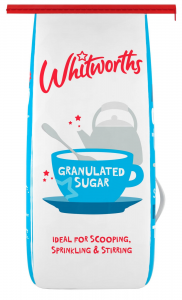
Bulk buying could be among the new trends wrought by the Covid-19 pandemic.
Hoarding and panic buying might ultimately have been a short-lived phenomenon – even if one of the more emblematic moments of the whole coronavirus crisis – but some of the changes it engendered could yet have a lasting impact on the grocery environment. Of these, bulk buying could be among the most obvious developments. New packaging options such as Whitworth’s new 5kg format for its classic white sugar are already catering to this latent demand, and more will surely follow.
At the other end of the spectrum, concerns over food security and hygiene are also likely to result in a boom in packaged, single-serve products – something brands such as MY/MO have been readily willing to exploit by introducing individually-portioned cups. The brand claims its new smaller format will address questions of food waste, as well as new-found concerns around contamination risk.
The obvious tension here, of course, is between the desire for fully-protected, ‘hermetic’ products on the one hand, and the countervailing pressure to act on packaging waste, and plastic waste in particular. This is likely to mean an even stronger imperative for companies to innovate through packaging than before the start of the pandemic.
SIMPLER PLEASURES
Shorn of modern entertainments, and in many cases finding themselves with an unexpected surfeit of spare time, many consumers have used Covid-19 lockdown as an opportunity to take a step back from the fast-paced nature of modern life and enjoy a return to more traditional hobbies and other simpler pleasures.
One of the key beneficiaries of this new-found passion has been the baking aids category, with flour, egg, cooking sauces and other staples quickly snapped up in supermarkets as consumers rediscover their love of home baking and cooking. Eagle-eyed firms have been quick to seize the opportunity, with the UK’s Roberts, for instance, launching a home-delivered Roberts Get Baking Kit – another example of how online channels can help brands reach consumers in times when social movement is limited.
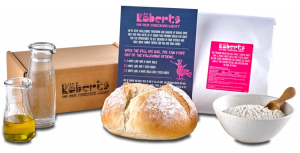
Companies are capitalizing on new-found interest in traditional pastimes, such as home baking.
Whether the new-found passion for simpler pleasures survives contact with the new freedoms of a post-Covid world may remain to be seen, but – as with the trend for risk-aversion – the interest in traditional pursuits also points strongly to a yearning for comfort and security faced with an outside world that is chaotic, threatening and uncertain. Companies that can address these new desires, as well as capitalize on renewed interest in traditional crafts and hobbies, are likely to be primed for success.
MEETING SHOPPERS IN NEW PLACES
Another striking impact of Covid-19 has been its impact not just on what consumers are buying, but where they are buying it. As long queues formed outside traditional supermarkets, and quarantine measures severely curtailed traditional shopping habits, many consumers turned to more local options, such as their nearest corner shop, or their local pharmacy, to meet their immediate shopping needs. While factors such as price and range may ultimately see many consumers lapse back to supermarket and hypermarket channels once lockdown restrictions ease further, the months and years ahead look promising for the convenience sector and independent businesses, especially if a new-found sense of community spirit motivates shoppers to support their local firms. Now could be a good moment for brands not currently supplying into the convenience sector to reassess their options.
At the other end of the spectrum, another unexpected beneficiary of the coronavirus pandemic may turn out to be wholesalers. Consumers that have become attuned to buying in bulk as insurance against future shortages may perceive wholesalers as offering better value than other retailers, even when membership fees are taken into account. Supermarkets – and the firms that supply them – will therefore need to be especially conscious of communicating value for money, whether through targeted promotions or by offering larger pack formats (such as the Whitworth’s example mentioned previously) to target price-conscious consumers.
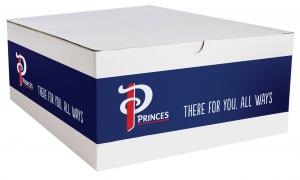
The trend towards direct-to-consumer (DTC) is likely to be accelerated.
Another shift in the way brands may try to seek out new consumers is the rise of home delivery / DTC, and not just for take-out food – as the previous Roberts and Princes examples ably demonstrate. The rapid growth of DTC over recent years, particularly in categories such as meal kits and male grooming, could well be accelerated by Covid-19, especially if many consumers opt for at-home cooking, leisure or self-care even after the current crisis recedes. This is an opportunity for FMCG suppliers: with some creative thinking, home-delivered or subscription products could not only open up new revenue streams, they could also provide a new touchpoint between brand and consumer that could leader to greater engagement and enhanced customer loyalty.
PLAYFUL BRANDING
Sometimes, playful branding is the most effective way of keeping a brand in sync with the news agenda. Brewdog’s Barnard Castle Eyesight Test Beer – a response to accusations that UK political aide Dominic Cummings broke government-imposed lockdown rules – garnered valuable publicity for the brand and underscored its reputation for irreverence. Meanwhile, in the US, Quarantine Spirits invoked the importance of personal relationships and conviviality with the launch of Quarantine Vodka, a product that “accentuates the precious times we share with others”. As with other companies, Quarantine Spirits is backing up its branding with a CSR initiative, in this case donating a bottle of hand sanitizer with every product sold.
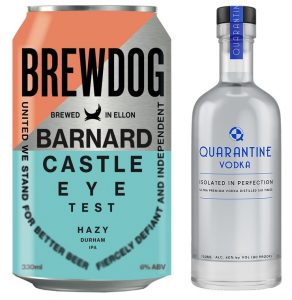
Playful branding is garnering some brands valuable publicity.
Both suppliers and retailers should take Covid-19 as an opportunity to build resilience and re-adapt their business for the medium and long term. Renewed community spirit and a return to traditional pastimes create new marketing and CSR possibilities, but companies should be careful they are seen as sincere and credible. Innovation in packaging is likely to intensify, as companies continue efforts to reduce plastic while also addressing new food security concerns and meeting demand for both convenience and bulk formats. Finally, flexibility in both supply chains and distribution will be an essential consideration, not just to mitigate against future disruptions but also to tap into the opportunities opened up by the direct-to-consumer model and a reinvigorated convenience channel.
About Gama Compass
Gama Compass is an exciting new service for consumer goods brands and retailers that offers fresh inspiration and allows you to take a more informed approach to product strategy.
Combining in-depth data and insights with the personal support of a dedicated Innovation Partner, Gama Compass is a unique platform that enables teams company-wide to unlock new opportunities through product innovation.
About Gama
Gama is a global provider of business information and services specializing in product innovation and international trade. Through our worldwide network of over 100 experts in more than 46 countries, we offer high-quality news, research, analysis and partnering services. We deliver actionable insights, enabling you to make more informed decisions and supporting you to unlock new business opportunities.
Notes to editors
Tom Warden, Gama editorial director, is available for comment. To arrange an interview please contact +44 161 818 8700 or info@gamaconsumer.com.
– ENDS –
